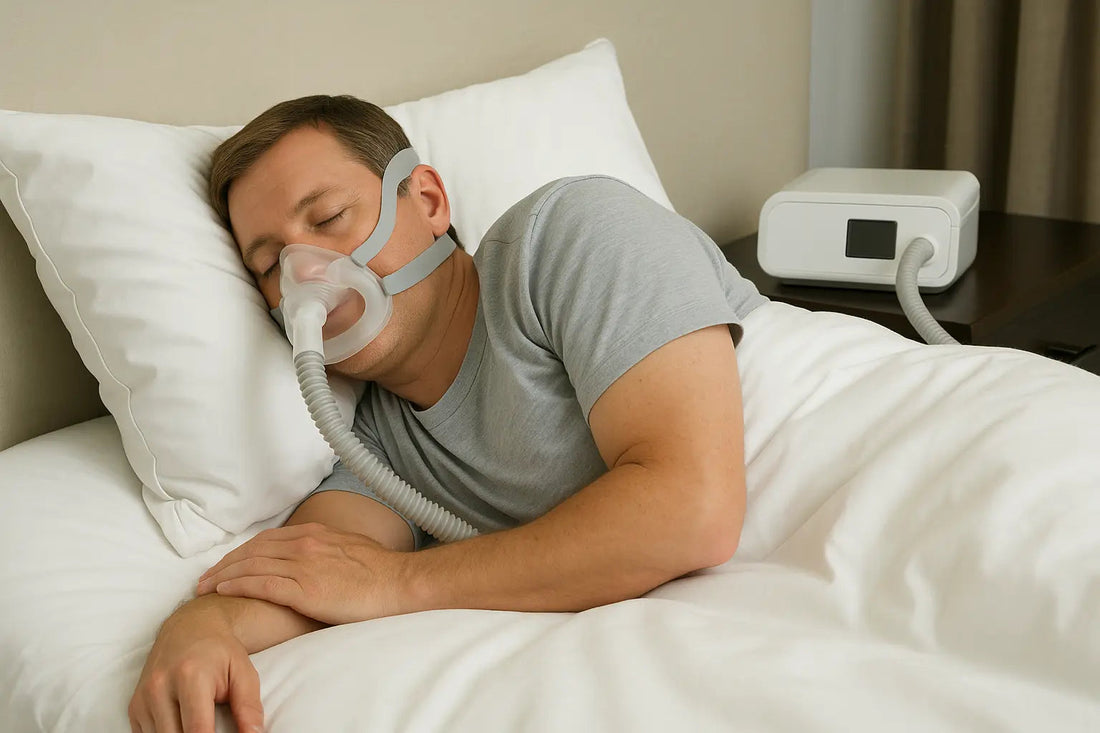The Silent Struggle: Understanding Sleep Apnoea and How to Treat It
Sleep Apnoea is a critical condition that significantly impacts life quality. For countless individuals, peaceful slumber is interrupted by an often undiagnosed disorder. This prevalent yet serious condition disrupts normal breathing patterns during sleep, resulting in inadequate rest, excessive daytime sleepiness, and potential chronic health issues.
This article delves into the nature of sleep apnoea, outlines its symptoms for recognition, and discusses various treatment strategies aimed at restoring optimal sleep health.

🔍 What Is Sleep Apnoea?
Sleep apnoea is a sleep disorder characterised by repeated interruptions in breathing during sleep. These pauses can last from a few seconds to over a minute and may occur dozens or even hundreds of times a night. Each time, your brain briefly wakes you up to resume breathing — often without you even realising.
There are three main types of sleep apnoea:
-
Obstructive Sleep Apnoea (OSA): The most common type, caused by the relaxation and collapse of throat muscles that block the airway.
-
Central Sleep Apnoea (CSA): A neurological issue where the brain fails to send proper signals to the breathing muscles.
-
Complex (Mixed) Sleep Apnoea: A combination of both OSA and CSA.
⚠️ Signs and Symptoms to Watch For
Many people with sleep apnoea are unaware they have it. It is often a bed partner or family member who notices the signs first. Common symptoms include:
-
Loud, chronic snoring
-
Gasping, choking, or pauses in breathing during sleep
-
Morning headaches
-
Excessive daytime sleepiness
-
Difficulty concentrating
-
Irritability or mood changes
-
Dry mouth or sore throat on waking
-
Poor memory or foggy thinking

🎯 What Causes Sleep Apnoea?
Several factors can contribute to sleep apnoea, particularly obstructive sleep apnoea (OSA):
-
Excess weight or obesity
-
Large neck circumference or narrowed airway
-
Smoking and alcohol use
-
Nasal congestion or sinus issues
-
Family history of sleep apnoea
-
Age (more common in older adults)
-
Men are generally at higher risk, although the condition also affects women
🩺 Why It Matters: The Health Risks of Untreated Sleep Apnoea
Left untreated, sleep apnoea can significantly impact your physical and mental health. It increases the risk of:
-
High blood pressure
-
Heart disease and stroke
-
Type 2 diabetes
-
Depression and anxiety
-
Accidents due to daytime sleepiness
-
Cognitive impairment and memory loss
Getting diagnosed and treated can dramatically improve quality of life — and even save lives.
🛌 How Is Sleep Apnoea Diagnosed?
If sleep apnoea is suspected, your doctor may refer you for a sleep study, which can be done at a clinic or at home using specialised equipment. These tests monitor your breathing, oxygen levels, and sleep patterns overnight to determine the presence and severity of the condition.
💡 Treatment Options: Take Back Control of Your Sleep
The good news is that sleep apnoea is highly treatable. Depending on severity and cause, your doctor may recommend:
1. Lifestyle Changes
-
Weight loss
-
Sleeping on your side
-
Avoiding alcohol and sedatives
-
Smoking cessation
2. CPAP Therapy (Continuous Positive Airway Pressure)
CPAP is the gold-standard treatment for moderate to severe obstructive sleep apnoea. A CPAP machine delivers a gentle, constant stream of air through a mask to keep your airway open throughout the night.
Modern CPAP devices are quiet, compact, and easy to use — and many users report dramatic improvements in sleep quality and daily energy within days.
3. Oral Appliances
Custom dental devices can reposition the jaw or tongue to help keep the airway open. Best suited for mild to moderate cases.
4. Surgical Options
In some cases, surgery may be considered to remove tissue, correct nasal issues, or adjust jaw positioning.
🛒 Looking for CPAP Machines and Masks?
At CPAP Supply UK, we offer a carefully selected range of CPAP machines, masks, heated tubing, and accessories from trusted brands. Whether you’re newly diagnosed or looking to upgrade your equipment, we’re here to support your journey to better sleep.
✅ Final Thoughts
Sleep apnoea may be invisible during the day, but its effects can be life-altering. If you or someone you love snores loudly, wakes up feeling tired, or struggles with focus and mood — it’s worth exploring the possibility of sleep apnoea.
With the right diagnosis and treatment, you can reclaim restful nights, sharper days, and a healthier future.E

